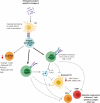Advancement of antigen-specific immunotherapy: knowledge transfer between allergy and autoimmunity
- PMID: 35919740
- PMCID: PMC9327121
- DOI: 10.1093/immadv/ltab009
Advancement of antigen-specific immunotherapy: knowledge transfer between allergy and autoimmunity
Erratum in
-
Correction to: Advancement of antigen-specific immunotherapy: knowledge transfer between allergy and autoimmunity.Immunother Adv. 2023 Jul 27;3(1):ltad004. doi: 10.1093/immadv/ltad004. eCollection 2023. Immunother Adv. 2023. PMID: 37521948 Free PMC article.
Abstract
Targeted restoration of immunological tolerance to self-antigens or innocuous environmental allergens represents the ultimate aim of treatment options in autoimmune and allergic disease. Antigen-specific immunotherapy (ASI) is the only intervention that has proven disease-modifying efficacy as evidenced by induction of long-term remission in a number of allergic conditions. Mounting evidence is now indicating that specific targeting of pathogenic T cells in autoinflammatory and autoimmune settings enables effective restoration of immune homeostasis between effector and regulatory cells and alters the immunological course of disease. Here, we discuss the key lessons learned during the development of antigen-specific immunotherapies and how these can be applied to inform future interventions. Armed with this knowledge and current high-throughput technology to track immune cell phenotype and function, it may no longer be a matter of 'if' but 'when' this ultimate aim of targeted tolerance restoration is realised.
Keywords: allergy; autoimmunity; immune tolerance; immunoregulation; immunotherapy.
© The Author(s) 2021. Published by Oxford University Press on behalf of the British Society for Immunology.
Conflict of interest statement
D.C.W. is Professor of Immunology at the University of Birmingham and CSO and Founder of Apitope International NV. N.R. declares that the research was conducted in the absence of any commercial or financial relationships that could be construed as a potential conflict of interest.
Figures


References
-
- Lerner A, Jeremias P, Matthias T. The world incidence and prevalence of autoimmune diseases is increasing. Int J Celiac Dis 2015;3:151–5. 10.12691/IJCD-3-4-8 - DOI
-
- Medawar R. Nobel lecture. NobelPrize.org. Nobel Media AB 2021. Available at: https://www.nobelprize.org/prizes/medicine/1960/medawar/lecture/
-
- Dakin R. Remarks on a cutaneous affection, produced by certain poisonous vegetables. Am J Med Sci 1829;4:98–100.
Publication types
LinkOut - more resources
Full Text Sources
